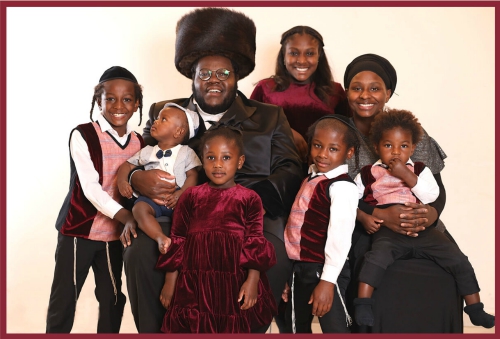By Laura E. Adkins
NEW YORK — Nissim Black is passionately, assuredly, confidently in love with G-d.
Not in love with Judaism, though he’s fastidious in prayer and observance. Not in love with spirituality, though most mornings, you can find him meditating in the Israeli hills after sunrise. Not in love with ritual, though he’s a devoted chasidic Jew.

Nissim Black with his wife and children (Yitzchak Meltz Photography)
No, Nissim Black is in love with the Creator of the universe, with whom he has an intimate and fierce connection. He’s faced no shortage of adversity, experienced myriad modes of connection with the divine. Yet he’s unapologetically who he is, doing what he loves — rapping — with the undeniable gifts — perceiving and conveying clear-eyed truth — he’s been endowed with.
Days after his 34th birthday, on which he released “The Hava Song,” JTA spoke to Black at length about his music, his faith and his communities.
This interview has been edited for length and clarity. The word Hashem, literally meaning “the name,” is a Hebrew word for G-d commonly used by Orthodox Jews in everyday speech.
JTA: You just released a totally transformative version of “Hava Nagila.” Walk me through how that happened.
Black: It was really a story of divine providence. Thank G-d, I have been out there enough that producers send me beats all the time [musicians frequently utilize sample tracks to layer under their own lyrics]. My brother-in-law is my producer. He’s really a tzaddik [righteous person], so I let all of the beats go to him. Because if it’s good, he’s gonna tell me.
So this particular producer sent me a WhatsApp message — I used that when I didn’t have management. My wife and I were driving home from the grave of Shimon HaTzadik in Jerusalem. And we got in the car, we’re driving for a little bit, and she just starts putting on beats. My wife never just puts beats on!
I’m like, where’d you get those beats from? She’s like, somebody sent it to you! The “Hava Nagila” beat came on, and I was flipping out over it.
He had a lot of good stuff on there. But that’s not my normal way of getting beats. So that one kind of slipped through the cracks. It was supposed to get to me.
I went home — I have a studio now in my house because of COVID — and I think within a few days, I had the song.
I can only imagine that with six kids at home, your day-to-day life is so crazy right now. What does it look like?
Thank G-d, everybody’s back in school except for my two youngest, but my wife manages that department and I’m either in the studio at my house or out running around handling other stuff that I have to handle musically.
I have a “Blackout” series on YouTube, so whenever I’m out, I have something to do. I have a camera guy that follows me around, or meetings or whatever else that comes along with it. But thank G-d, even when my kids were at home, I spent a lot of time inside the studio.
I don’t know how that happened, my kids were downstairs and I just gave a few hours, went up and worked on music, and then came back down. When I got sick with COVID, I came back home and was self-quarantining. But still, looking back, I’m like, how did I get that done? Even though they’re in school, now I can’t get anything done!
What is your Torah study schedule these days?
I’m actually looking for a new kollel [Torah institute] to learn in. But usually I get up very, very early. In a normal week — this week has not been normal — I usually get up to pray at sunrise, the earliest you can daven [pray].
I usually daven with an early morning minyan, and then I usually learn for a while. And then I go out to the field and meditate. I’m a Breslover chasid, so I go out to the fields and go talk to Hashem. I go out to a lot of beautiful open meadows and forests here in Beit Shemesh.
Then after that, I get to work. And then after I’m done with the kids and speak to my wife, late at night, I’m also working. I’ve either got a Zoom, some type of interview, some type of something, usually at night to 2, 1, something like that. Ain’t no rest for the weary.
Your family immigrated to Israel from the US in 2016. What was the adjustment to Israeli life like for you?
It’s been a lot of adjusting. Obviously, right? None of your favorite products are here. Nobody really stands in lines. Depending on the neighborhood you live in, you know, people may bump into you, step on your shoe, and if you take a problem with that, then they look at you like, “what’s wrong?”
Normal Israeli life is very, very hard. But when two taxi drivers start yelling at each other, it doesn’t mean that it’s going to end with gunshots.
So it’s just cultural differences. Everybody accepts the fact that Israelis all stare. Me, my wife, all the kids, everyone is just going to stare at us, which I just was raised that you never do. Those things have been very hard to adjust to.
I have it twofold because also I’m very, very known here. So I never know why they’re staring. Sometimes it gets a little out of hand, you know?
In 2018, you met with Rabbi Chaim Kanievsky [a leading haredi rabbi in Israel]. It seemed like a very inspirational meeting, but unfortunately, you were there because your children were not being allowed into haredi schools due to racism. What was that meeting like for you? Has the Orthodox community gotten any better on these issues since then?
I was having issues getting my kids into the cheder [religious elementary school] when I was in Jerusalem. My boys were actually in schools, but my daughter was not in school. We tried for a year-and-a-half to get her into [a haredi] school. We could have gotten her into a different school but getting into one that matched the religious level of our home was much more difficult.
One of the biggest issues is misconceptions. A person’s skin color, or their career choice, doesn’t always necessarily have to reflect your prejudices.
That definitely played a role. It’s unfortunate — it’s like that with any system, right? Once there’s a system that people have accepted, it’s very, very hard for people to ever really get out of the box of that way of thinking that keeps them stuck inside of that system.
So unfortunately, it was very hard for us there. But very fortunately, it was good because we ended up moving to Beit Shemesh [a growing Orthodox community outside of Jerusalem]. We were able to get the kids into school in Beit Shemesh, which ended up being a way better choice for our family.
There are some places where it’s going to be very, very hard for them to ever change. At the same time, you just sort of have to move where it’s going to fit your situation a little bit better.
I feel like we did that. It was a tough thing because nobody ever wants to leave Jerusalem. But at the end of the day, it turned out to be the best decision we could have made.
My kids are in school now. They’re all happy here. Baruch Hashem, they have tons of friends. And two of every type of color and shade come to my house on Saturday. It gets a little annoying, the house is loaded with kids, but Baruch Hashem, the kids are happy.
We still live in a very haredi neighborhood. It was so shocking to my kids to feel accepted. My son, when he first got invited to a Tehillim group [recitation of Psalms] on Shabbos from a bunch of yeshivishe boys, he was tripping out. Because that just never happened in Meah Shearim. There’s just just every type of love and acceptance over here.
Wow, that sounds like it ended up being for the best. You mentioned that your brother-in-law is your producer. He also converted, right?
Yeah, we’ve been best friends since kindergarten.
That’s amazing. Are you close with other people in your family? How did you and your wife’s choice to become Jewish and become a part of the haredi community affect your other relationships?
In the beginning it was hard for everybody — for my wife’s family, her accepting a new faith was a rejection of their faith.
My biological father was actually very, very supportive. He’s actually a Christian theologian, a professor.
He used to sell a lot of drugs back in the day, but now he runs an addiction program. If you met him, you would never think he had the past that he had.
It’s a different religion, but I think because he made such a drastic change and has become a different person, he was just very happy and cheering me on.
My stepfather and all the rest of my family took it as a sort of a hit because my growth included me having to separate myself for some years. So that was very, very tough on them.
But I think it was a necessary move at that time. Slowly but surely, I’ve been back in touch with my family. I talked to my stepfather — I call him my dad because he’s been my stepfather since I was two years old. I was just fortunate enough to have him in my life.
But it was tough. Because the drug and street life were still very much still a part of that world at the time I was making my transition. Especially when I found out that I was going to have a child, I was like, no way in the world I’m going to raise them back in that same environment that I grew up in.
Thank G-d I’d had a change of mind and a change of heart at a time already.
I was listening to one of your Blackout videos, and you mentioned that Judaism isn’t about religion to you, it’s about the spirituality and the personal relationship with Hashem. Your religious journey has been written about, but I’m curious to hear more about some of the big shifts in your own spirituality over the years and how that impacted your music.
I think the main thing is, I’m one that really believes you’ve got to live with Hashem. I never signed up for Judaism because of everything you can’t do. I didn’t go, oh man, I can’t wait to not be able to do anything on Saturday, to not be able to eat what I want.
It was all of the things that you can do in the beautiful relationship that Hashem had with the Jewish people.
Naturally, [growing up Muslim and Christian], I didn’t have any knowledge of the Oral Torah, or Jewish law. When I started, all I had was a JPS Tanakh, and I read it from cover to cover looking for the behavior that G-d had, looking for G-d’s behavior, and people’s behavior, and what that relationship was supposed to look like and what it was supposed to be.
The interesting thing is, you never find that Moshe Rabbeinu [Moses] had a major problem and his solution was to go learn a tractate of Gemara. That’s not what happened — he cried out to Hashem. King David was going to lose his son, so he fasted and afflicted himself and cried out.
So this is what I was seeing. You have to understand, to me, this is what Judaism wants. As opposed to today where there’s more systemizing. There’s Batei Midrashot [Torah study halls] and beautiful things birthed also. But one of the things you lose about that organic spirituality in relationship with Hashem, it’s like you almost missed the boat on what we’re supposed to be doing in the first place, you understand?
I think because I fell in love with Hashem, so to speak, it was easier for me to make my transition. Shabbat wasn’t an “I have to.” It was an “I get to,” you know what I mean?
I get to eat kosher. I get to. And I think because I started off with that type of relationship, I’m looking at the religious lifestyle as a relationship much less than I am as a strict mandate of what has to happen. Because I’m already in love with Hashem.
















